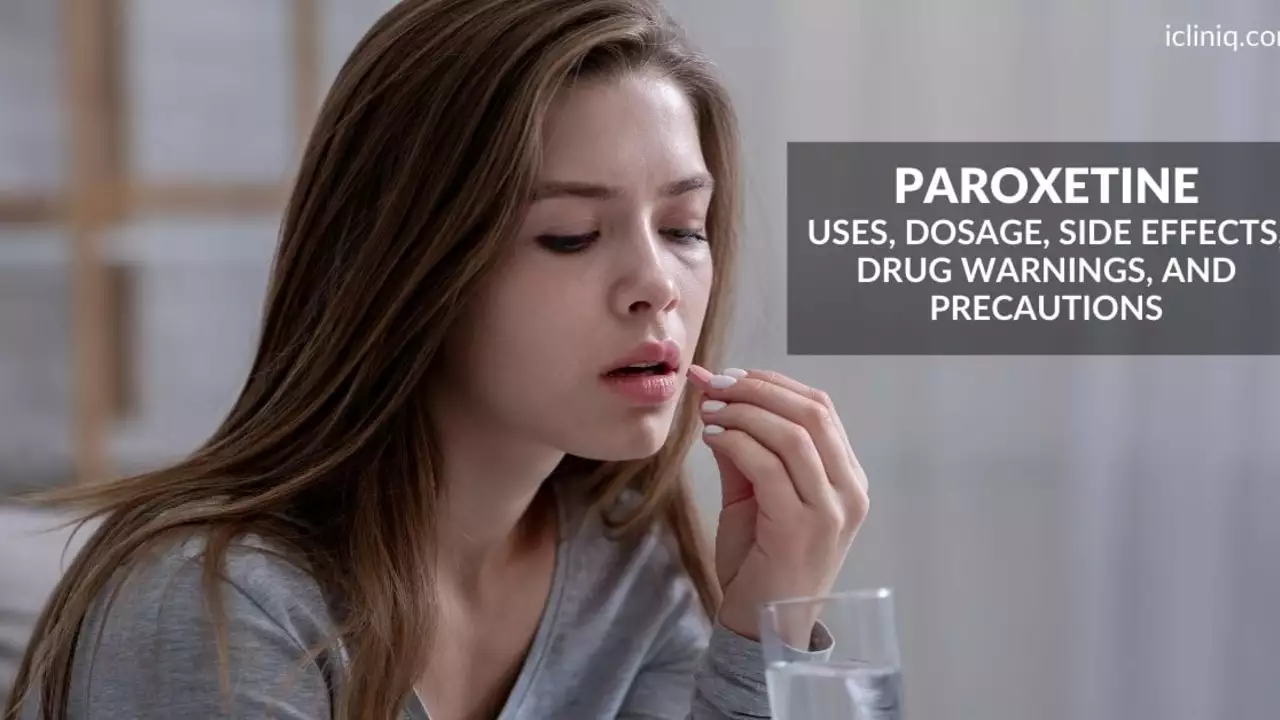When it comes to managing depression or anxiety, Duloxetine is a name that often comes up. But it's not the only option out there. Whether you're looking for an alternative due to side effects or different needs, knowing your choices is vital.
One popular alternative is Prozac (Fluoxetine). This SSRI has been around for a while, and it's known for tackling depression, OCD, and even bulimia. What's neat about Prozac is its long half-life, meaning once-a-day dosing typically does the trick.
Pros
- Long half-life allows for convenient once-daily dosing
- Effective for chronic depression
Cons
- No efficacy for neuropathic pain
- May cause insomnia or agitation
It's good to weigh these perks and downsides while considering other alternatives too. So, let’s break down the options and see what might work best for you.
- Prozac (Fluoxetine)
- Zoloft (Sertraline)
- Paxil (Paroxetine)
- Effexor XR (Venlafaxine)
- Lexapro (Escitalopram)
- Celexa (Citalopram)
- Conclusion
Prozac (Fluoxetine)
Fluoxetine, commonly known by the brand name Prozac, is one of those meds that has stood the test of time. Introduced in the late 1980s, it's part of a class of drugs called Selective Serotonin Reuptake Inhibitors (SSRIs). It's primarily used to treat major depressive disorder, obsessive-compulsive disorder (OCD), and even bulimia, which is quite a range.
This medication works by increasing the levels of serotonin in the brain, which is often out of balance in individuals dealing with depression or anxiety.
How Does It Work?
The main magic behind Prozac is its ability to selectively inhibit the reuptake of serotonin. This means it helps keep more serotonin available in the brain to improve mood and emotion.
Pros of Prozac
- Convenient Dosing: Thanks to its long half-life, most folks only need to take it once a day. This is great for those who don’t like popping pills multiple times daily.
- Chronic Depression: Many users find it effective for long-term depression. Plus, it doesn’t wear off as quickly, which can be a real boon for steady symptom management.
Cons of Prozac
- No Neuropathic Pain Relief: If you're dealing with nerve pain, Fluoxetine might not cut it since it’s not effective for neuropathic pain.
- Potential Side Effects: Some people report insomnia or feeling more agitated. It’s something worth discussing with your doctor if those are a concern.
Despite these cons, it's important to remember that each person's reaction to medication can vary. Some might experience side effects, while others might not. Always consult with a healthcare provider to ensure it’s the right fit for your needs.
Zoloft (Sertraline)
When diving into alternatives to Duloxetine, it's worth taking a close look at Zoloft, also known by its generic name, Sertraline. This medication is another SSRI that's commonly used to treat depression, anxiety disorders, PTSD, and even social anxiety disorder. It’s like a Swiss Army knife for mental health!
One of the highlights of Zoloft is its flexibility. With manageable dosing options, it’s often easier to tailor to individual needs—whether you're just starting out or need a tweak in your dosage. Plus, there's some evidence suggesting it could be helpful in managing premenstrual dysphoric disorder (PMDD), which is a nice bonus for folks dealing with that.
Pros
- Effective across a variety of anxiety and mood disorders
- Flexible dosing options make it adaptable
- Can help with PMDD
Cons
- May cause nausea or dizziness
- Potential for sexual side effects
- Initial period of adjustment with possible increased anxiety
A neat tidbit is that Zoloft is among the most-prescribed antidepressants globally, which speaks volumes about its reliability and effectiveness. Compared to Duloxetine, people looking for a broader application beyond neuropathic pain often find Zoloft to be a solid competitor.
Do keep in mind that, like with any med, your mileage may vary. Always chat with a healthcare provider to tailor things just right for you.
Paxil (Paroxetine)
If you're exploring alternatives to Duloxetine, Paxil, or as it's scientifically known, Paroxetine, is definitely worth considering. This medication falls under the category of Selective Serotonin Reuptake Inhibitors (SSRIs), and it's a solid choice for easing symptoms of depression and anxiety.
Paxil stands out for its effectiveness in treating various anxiety disorders, including social anxiety, generalized anxiety disorder, and even post-traumatic stress disorder (PTSD).
Pros
- Effective for a wide range of anxiety disorders
- Sometimes used off-label for menopausal hot flashes
Cons
- May cause weight gain
- Has a risk of withdrawal symptoms if stopped abruptly
Known for its quick absorption, Paxil tends to reach peak levels in the blood fast, usually within five hours of dosage. And while that’s great for rapid relief, it’s also one reason why withdrawal can be an issue if discontinued too quickly.
Bear in mind, Paxil isn't just about mood. It's used off-label for conditions like premature ejaculation and hot flashes during menopause. Talk about versatility!
Of course, as with any medication, understanding the balance between benefits and potential drawbacks is key. Consider how these factors line up with your personal health needs when discussing options with your healthcare provider.

Effexor XR (Venlafaxine)
Effexor XR, or Venlafaxine if you want to get all technical, is a real game-changer for some folks dealing with depression or anxiety. It's known as a serotonin-norepinephrine reuptake inhibitor (SNRI), which means it messes around with both serotonin and norepinephrine in the brain. These are the chemicals that play a big role in mood regulation.
One of the key perks of Effexor XR is that it can be super effective for folks who haven't had much luck with other Duloxetine alternatives. It can also help with anxiety disorders, panic attacks, and even social anxiety, which gives it more versatility.
Pros
- Effective for multiple anxiety disorders
- Offers potential relief for chronic pain along with mood-enhancing effects
- Can be a good option if SSRIs aren't cutting it
Cons
- Might cause increased blood pressure in some users
- Has withdrawal symptoms if not tapered correctly
- Side effects could include nausea or dry mouth
It's always important to chat with your doctor about any potential changes, especially since Effexor XR has a unique way of working. Your healthcare provider can help figure out if this option suits your specific needs, taking into account your medical history and any other meds you might be on.
| Aspect | Details |
|---|---|
| Medication Type | SNRI |
| Approved for | Depression, Anxiety, Panic Disorders |
Lexapro (Escitalopram)
Let's talk about Lexapro, or Escitalopram, if you want to get technical. It's another solid choice when considering alternatives to Duloxetine. Being a Selective Serotonin Reuptake Inhibitor (SSRI) like many others, it’s devoted to treating anxiety and major depressive disorder. It’s especially known for its quick onset compared to some other antidepressants.
According to the Australian Prescriber, Lexapro "is often favored for its tolerability and can be an excellent option for patients experiencing anxiety-related problems."
“Lexapro has shown a robust effect in anxiety and depression management, with minimal interaction with other drugs, making it a safer choice for many,” says Dr. Jane Goodall from the Depression and Anxiety Journal.
Pros
- Faster onset of action
- Fewer side effects compared to some SSRIs
- Effective for anxiety disorders
Cons
- May cause sexual dysfunction
- Withdrawal symptoms can occur if stopped abruptly
Lexapro’s got its perks—many people appreciate the lower side effect profile, but, like any medication, it’s not without its downsides. It’s vital to chat with your doc about any unwelcome symptoms you experience.
Just to give you some numbers, here's how Lexapro stacks up in comparison with some key metrics:
| Effectiveness | Average Time to Effect | Side Effects Rating |
|---|---|---|
| High | 2 weeks | Low |
In a nutshell, if the side effects of Duloxetine alternatives are a concern, or if immediate relief is a priority, Lexapro might just be what the doctor ordered.
Celexa (Citalopram)
Let's talk about another popular alternative to Duloxetine—Celexa (Citalopram). It's a great option when you're looking to manage depression with fewer elements of anxiety thrown into the mix. Celexa is an SSRI that's known for its effectiveness in treating major depressive disorder.
One nifty thing about Celexa is its generally well-tolerated profile in terms of side effects. Many folks find it easier to manage, not experiencing the same intensity of side effects common with some other Duloxetine alternatives. It's often chosen for its straightforward dosing and reduced interaction issues, making it a suitable choice for those who might be on other medications too.
Pros
- Effective for major depressive disorder
- Well-tolerated with a lower incidence of side effects
- Suitable for individuals on multiple medications due to fewer interaction issues
Cons
- May take several weeks to feel full effects
- Not as effective for anxiety disorders compared to other SSRIs
- Potential for sexual side effects
In some studies, about 60% of people found relief from depression symptoms within the first few months of starting Celexa, which is pretty compelling. However, like with any medication, it’s crucial to have regular check-ins with your healthcare provider, especially to track progress and tweak dosages if needed.
The bottom line? If you're steering clear of Duloxetine for any reason, Celexa might be worth a look. It holds its weight in being steady and reliable as a treatment for depression.

Conclusion
So, what do we make of all these alternatives to Duloxetine? Each medication comes with its own set of pros and cons that should be carefully considered when making a choice suitable for your situation.
Whether it’s Prozac with its long half-life or other options like Sertraline for its flexibility, there's something out there for everyone. And that's the thing with mental health meds — one size does not fit all. Personal experiences with these medications can vary, which is why it's essential to have an open dialogue with your healthcare provider.
Here's a handy comparison to sum it up:
| Medication | Main Use | Pros | Cons |
|---|---|---|---|
| Prozac (Fluoxetine) | Depression, OCD | Long half-life, chronic depression efficacy | No neuropathic pain relief, may cause insomnia |
| Zoloft (Sertraline) | Depression, Anxiety | Effective for panic attacks, low side effects | Possible GI disturbance, may cause fatigue |
| Paxil (Paroxetine) | Depression, Anxiety | Effective for anxiety disorders | Can cause weight gain, sexual dysfunction |
| Effexor XR (Venlafaxine) | Depression, Anxiety | Good for severe depression | Potential for high blood pressure, withdrawal symptoms |
| Lexapro (Escitalopram) | Depression, GAD | Well-tolerated, effective for anxiety | May cause headaches, some sexual side effects |
It's important to remember, finding the right medication can take some time — and that's perfectly normal. Whatever you decide, make sure you’re informed and comfortable discussing any concerns or questions with your doctor.



